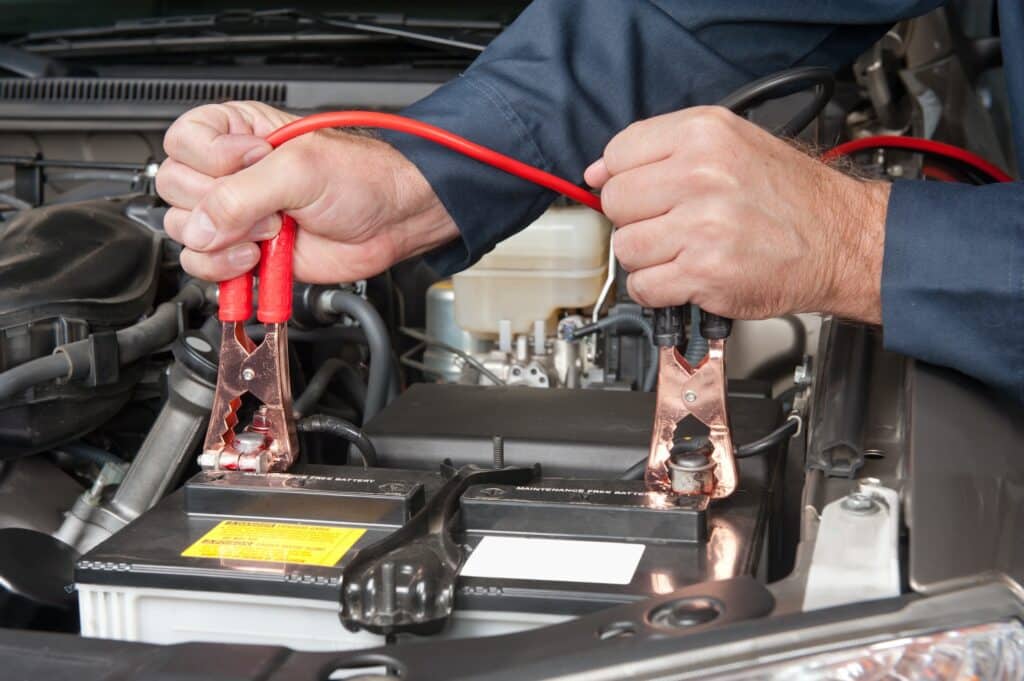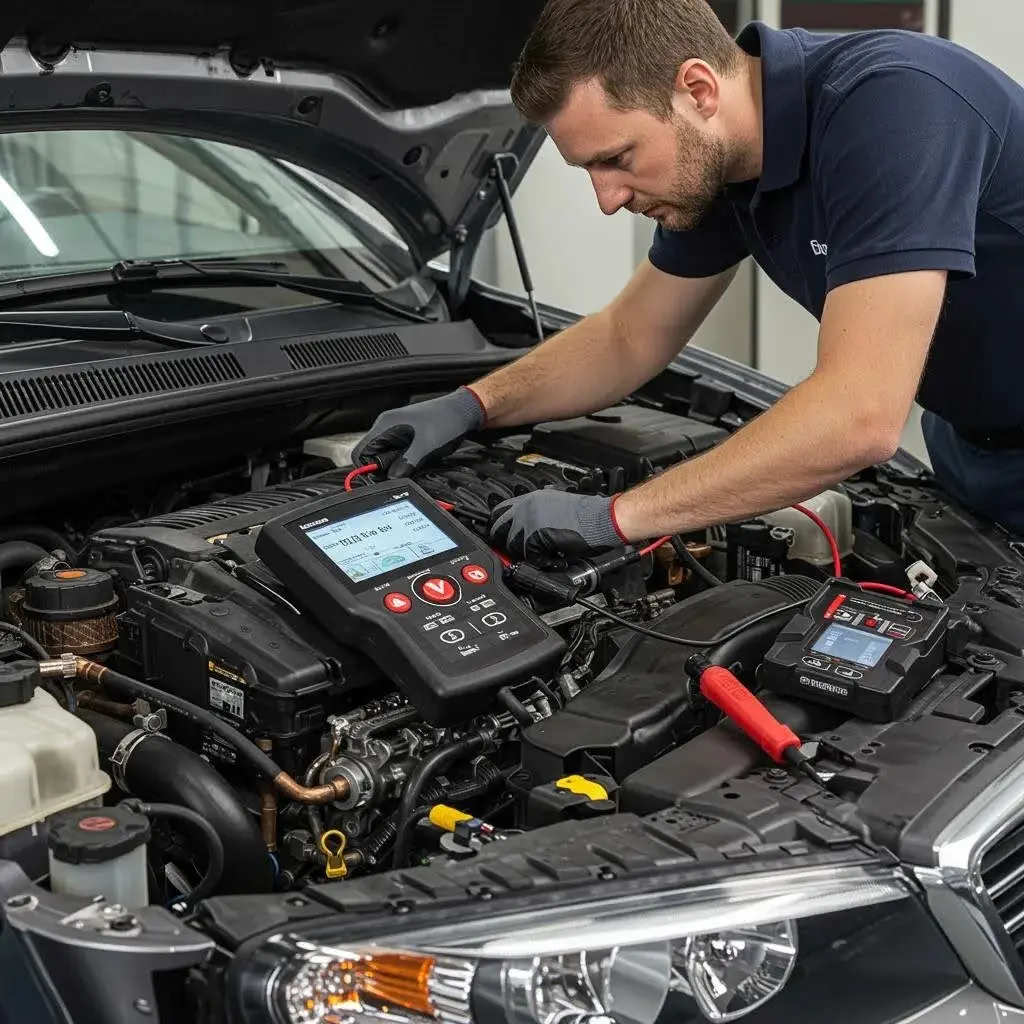A car battery is the quiet force that helps start your engine, but it has a limited lifespan. On average, most batteries last between three and six years. This depends on your driving habits, the climate, and how well you maintain the battery.
In this post, you will find out how long a car battery usually lasts, the main factors affecting its lifespan, the warning signs indicating a battery is failing, and easy steps to make it last longer and prevent sudden breakdowns. With proper care, you can keep your vehicle dependable and ready for the road.
How Long Does a Car Battery Last and What Factors Affect Battery Lifespan?

Car batteries last between three and six years on average, but many factors affect their lifespan. How long they last depends mainly on your driving habits, the climate, and your vehicle’s charging system.
The car battery lifespan can be influenced by factors such as maintenance, driving habits, climate, environmental conditions, and usage patterns. It’s not uncommon to get up to five or six years out of a battery in a car driven daily in a temperate climate with a properly functioning charging system. However, a battery used occasionally may only last for a short time.
The battery type also plays a role in how long your car battery will last, as different types have varying capacities and resistance to environmental factors. By ensuring your charging system is functioning correctly, limiting short trips that prevent your battery from fully charging, and protecting it from extreme temperatures, you can get the most out of it and potentially extend its life beyond the typical three-to-six-year range.
Certain habits and conditions, such as frequent short trips or exposure to harsh climates, can reduce battery life.
What Signs Show Your Car Battery May Need Replacing?
Recognising the signs of a battery warning can be crucial in maintaining an optimal battery life in your vehicle. It’s not uncommon for car owners to overlook battery service until they’re stranded with a dead car battery. However, a proactive approach can prevent this frustrating scenario.
- A key sign that your car battery’s life is diminishing can be the check engine light. The check engine light is often the first indicator of a battery warning.
- Additionally, a clicking sound when starting the engine can indicate a problem with the car’s battery, often pointing to insufficient power or battery deterioration.
- However, not every battery warning is as conspicuous as the check engine light. For instance, a noticeably slower engine cranking can also indicate that your battery life is in decline. Corrosion buildup on the battery terminals is another subtle warning sign. It might not seem like much, but it can significantly impair a car battery’s performance and shorten its lifespan.
Moreover, regular battery service and monitoring your battery’s health can significantly improve its life. At SME, we understand the importance of a healthy car battery. Therefore, we recommend testing your battery during routine maintenance to ensure it operates efficiently.
Your battery should be tested annually, especially as it ages or before winter, to ensure reliable performance and prevent unexpected breakdowns. Timely battery service can help maintain a robust battery life, saving you money and stress in the long run.
Key Considerations for Extending Your Car Battery Life
Regular battery checks are paramount to getting the full potential out of your car battery. It helps to assess the excellent condition of batteries, thus extending the battery life, and may notify you in advance when a replacement battery is next needed.
Timely car battery replacement is important to avoid unexpected breakdowns and ensure your vehicle remains functional. Therefore, knowing how long a car battery should last is even more crucial.
Batteries operate under severe conditions, including extreme temperatures, high vibrations, and continual recharging, which can diminish the lifespan of your car’s battery. Prompt replacement of dead batteries is essential to maintain vehicle reliability and performance.
What Affects a Battery’s Lifespan in Cars?
Typically, car batteries shouldn’t continuously be in a discharged state. Repeated removal and recharging cycles can strain the battery, reducing its lifespan. Additionally, a parasitic drain whch occurs when electrical components draw power even after the engine is off, can lead to battery discharge and shorten its life.
It’s therefore essential to frequently check your car’s electrical system to ensure it’s not overcharging the storm, which could lead to damage and a shortened battery life.
Adverse weather conditions can also affect how long car batteries last. Extreme hot and cold temperatures can severely impact a battery’s lifespan, causing it to degrade faster. Over time, a battery degrades due to environmental and usage factors, resulting in reduced charge capacity and performance. Particularly in winter, the chemicals within the battery work harder to produce energy, which strains the battery.
Lastly, the vehicle’s overall health influences how long a car battery should last. For instance, a car with a faulty alternator may overwork the battery, leading to a shortened lifespan.
Maintaining the charging systems, including the battery, starter, and alternator, is crucial for optimal battery performance. Modern cars’ electronics, such as onboard computers and auxiliary systems, can also contribute to battery drain even when the vehicle is not in use. Keeping your vehicle in top condition ensures that every part, including the battery, operates optimally.
Battery Degradation: Why Car Batteries Wear Out Over Time
Car batteries, especially the lead-acid batteries found in most cars, naturally degrade as time passes. This process is driven by a combination of chemical reactions and physical changes inside the battery.
Over time, internal corrosion can develop on the battery plates, reducing the battery’s ability to hold and deliver electrical energy. Another common issue is sulfation, where lead sulfate crystals build up on the plates, especially if the battery is left discharged for extended periods.
These changes gradually reduce the battery’s efficiency and capacity, making it harder for your car to start and power its electronics.
Deep discharging, allowing the battery to become completely flat, also puts extra strain on the battery, shortening its lifespan. Improper maintenance, such as neglecting to check the battery terminals for corrosion or failing to keep the battery clean, can further contribute to early battery failure.
To help your car battery last as long as possible, it’s important to perform regular maintenance. This includes cleaning the battery terminals, checking for signs of corrosion, and ensuring the battery is securely mounted. By understanding how and why car batteries degrade, you can take steps to slow the process and avoid being caught off guard by a dead battery.
Maintaining a Battery Clean: The Role of Cleanliness in Battery Performance
Keeping your car’s battery clean is more important than many drivers realise. Corrosion on the battery terminals can interrupt the flow of electrical current, leading to problems like slow engine cranking, dim headlights, and other electrical issues.
Dirt and debris can also interfere with the battery’s connections, making it harder for your car’s charging system to keep the battery at full capacity.
Routine maintenance, such as regularly inspecting and cleaning the battery terminals, helps prevent corrosion and ensures a strong connection between the battery and your car’s electrical system.
Using a simple mixture of baking soda and water, you can gently clean away any buildup on the terminals, helping to maintain optimal battery performance. This small step can make a big difference in preventing unexpected battery failures and keeping your car running smoothly.
By making battery cleanliness a regular part of your vehicle maintenance routine, you not only extend the life of your battery but also help prevent common electrical issues that can leave you stranded.
Understanding Battery Quality: Why It Matters for Longevity
When it comes to car batteries, quality truly matters. A high-quality car battery, such as an AGM (Absorbent Glass Mat) battery, is designed to last longer and perform better than lower-quality alternatives.
Battery quality is determined by the materials used, the manufacturing process, and the overall design. These factors influence how well the battery can withstand the demands of your car’s electrical system and how it performs in challenging conditions, like cold weather.
One key indicator of battery quality is the cold cranking amps (CCA) rating, which measures the battery’s ability to start your car in low temperatures. A higher CCA rating means the battery can deliver enough power even when the weather turns cold. High-quality batteries also tend to come with longer warranties and are less likely to suffer from rapid degradation or early failure.
When it’s time for a replacement battery, choosing one that matches your car’s specifications and driving needs is essential. Investing in a quality battery ensures reliable performance and can save you money in the long run by reducing the frequency of replacements.
Always consider battery quality as a top priority to maximise your car battery’s lifespan and keep your vehicle running at its best.
How Long Does a Battery in a Vehicle Last Without the Engine On?
This largely depends on the type of battery and the specific vehicle the battery is in. A vehicle left inactive for a prolonged time without the engine running can negatively impact how long the battery lasts. To preserve battery health during extended periods without use, it is recommended to use a battery maintainer or a trickle charger, which can provide a steady charge and prevent battery drain and degradation.
While a high-quality battery can significantly extend your battery’s lifespan, it ultimately depends on your driving style, the frequency of engine use, the types of battery, and overall vehicle maintenance. Understanding this can be vital in ensuring a vehicle’s battery lasts as long as it should.
Common Car Battery Problems that Impact How Long Your Car Batteries Last
Understanding how long car batteries last requires us to investigate common car battery problems. One such issue impacting how long your car batteries last is ‘sulphation’.
Sulphation is a condition where your battery gradually deteriorates, resulting from not using the car for extended periods. A storm is an essential part of the car, so maintaining it is crucial; otherwise, it will only last for a short time. In addition, start-stop technology in modern vehicles can contribute to increased battery wear due to frequent engine restarts.
Extreme temperatures can also affect how long car batteries last. Heat accelerates chemical activity but lowers battery lifespan, while cold weather can make batteries work harder to kick-start your car’s engine, draining them quicker. A car’s electrical system can have issues causing battery drains, so monitoring signs of battery warning is vital to preserving battery life. In newer cars, advanced electronics and features like infotainment screens and stop-start systems can introduce unique battery challenges.
How to Change a Car Battery
Replacing a car battery yourself involves several important steps. First, remove the old battery from your car. Then, install and connect the new battery.
With a replacement battery, you can ensure good performance for your vehicle and extend the battery’s life for years. Proper care and charging of the EV battery are important for maintaining full range and ensuring optimal driving distance.
While changing your car battery yourself may seem easy and cheaper, things can easily go wrong. Getting professional help to change your car battery and address other car issues is better. Often, it’s cheaper to let a professional handle it than to try it yourself.
Frequently Asked Questions About How Long Does A Car Battery Last
How long does a car battery usually last?
Most car batteries typically last between three and six years. However, this may vary based on driving habits, weather conditions, vehicle conditions and frequency of use. With appropriate care and maintenance, this lifespan may sometimes be extended.
How do environmental factors influence a battery’s lifespan?
Extreme temperatures can impact a battery’s life. Cold weather might slow down the chemical reactions within the battery, while extreme heat and hot weather can speed them up. Both conditions can lead to the premature dysfunction of a car battery.
What practices should be followed to maximise a car battery’s longevity?
To prolong your battery’s lifespan and maintain the battery’s health, ensure that your vehicle’s charging system functions correctly, limit short trips as they prevent your battery from fully charging, protect it from extreme temperatures, and perform regular battery checks and maintenance.
What are some warning signs indicating a decline in battery life?
There are many indicators of a declining battery life, including the check engine light, slower engine cranking, a clicking sound when starting the engine, and corrosion buildup on the battery terminals. Regular battery checks help to identify issues before they become problematic.
How does regular battery service influence a car battery’s lifespan?
Regular battery service can significantly improve a car battery’s life by ensuring it operates optimally. It is recommended that your battery be tested annually to ensure optimal performance and prevent unexpected breakdowns.
Regular checks and timely battery service can help maintain a robust battery life, saving you money and potential inconvenience in the long run.
Does keeping the engine off for prolonged periods affect battery lifespan?
Leaving the engine off for long may accelerate battery drain. The engine plays a crucial role in recharging the battery during operation.
Additionally, parasitic drain from electronics and onboard systems can continue to draw power even when the engine is off, further accelerating battery discharge. Therefore, keeping the vehicle inactive without running the engine may negatively impact the battery’s lifespan.
Conclusion
A car battery typically lasts three to six years. However, its lifespan depends on maintenance, operating conditions, and the battery’s quality.
Regular servicing, annual testing, and timely replacement are crucial to prevent unexpected breakdowns and expensive repairs.
By noticing early warning signs, shielding your battery from extreme weather, and choosing quality products, you can extend its life and ensure your vehicle runs reliably. Taking care of your battery helps your car run well and provides peace of mind every time you start it.




